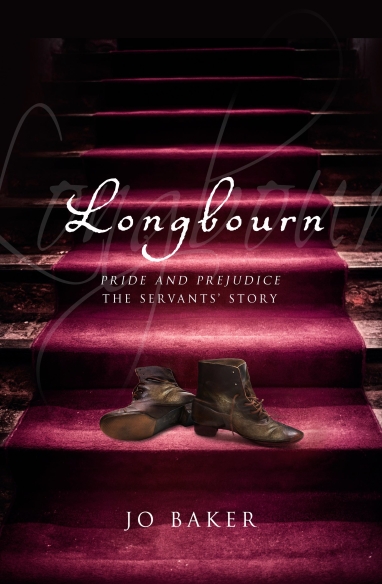What happened below stairs at the Bennet residence while Pride and Prejudice was taking place upstairs? In Jo Baker’s version of events, Mrs Hill is the housekeeper and her husband, Mr Hill, oversees the farm hands and drives the carriage when necessary. Mrs Hill is helped with the domestic arrangements by Polly, a young girl, and Sarah. It is Sarah who leads us through the majority of the novel.
The pails slopped as Sarah stumbled back across the yard; she was just approaching the scullery door when her foot skidded out from underneath her, and her balance was gone. The moment extended itself, so that she had time enough to see the pails fly up and away, off the yoke emptying themselves, and see all her work undo itself, and to realise that when she landed, it would hurt. Then the pails hit the ground and bounced, making a racket that startled the rooks cawing from the beeches; Sarah landed hard on the stone flags. Her nose confirmed what she had already guessed: she had slipped in hogshit.
Baker concerns herself with the minutiae of life (as befits the role of a servant at the time) and she makes it clear from the outset that it is not pretty – there is plenty of talk of chamber pots and the washing of rags soaked in menstrual blood. If you’re looking for a cosy domestic drama, you’ll not find it in Longbourn.

However, what you will find is two-fold. If you’re a fan of Pride and Prejudice, you’ll find an interesting, ‘working class’ take on a well-loved story. You’ll see how the Bennets interact with the servants and you’ll see what the servants (and occasionally the locals) think of some of the main players in the original story. The domestic details surrounding Mr Collins’ visit were quite fascinating, as were his chats with the servants and I loved the perspective given of Wickham, bringing his villainous behaviour to the forefront.
The second thing you’ll get from the novel is the servants’ own stories. These are trigged by the arrival of a mysterious stranger:
There he was. Because it was a man, she was sure of it: a glimpse of gray and black, a long loping gait; a man used to distances…And he was gone, behind a stretch of knotted blackthorn. But there was something else now; Sarah could almost hear it: a flicker of sound, as though he – the scotchman that he must be, with his tally-stick scotched with accounts, and a knapsack full of silliness and gewgaws – was whistling to himself. It was faint, and it was strange; it seemed to come from half a world away.
The following day, the servants are told they have a new footman and it is he, the mysterious stranger, one James Smith. This causes consternation downstairs – Mrs Hill is in uproar and Sarah finds it ‘new and strange’.
Sarah’s about to find life altogether ‘new and strange’ as finds herself in close proximity to two men of similar age and status to herself. James Smith is one. The other is Ptolemy Bingley, footman of he of ‘four or five thousand a year’, and ‘a mulatto’. Both men potentially ‘dangerous’ in their own ways.
It was this thread that I found most interesting. I think some Pride and Prejudice aficionados might balk at the twist that links the two parts of the story together but it was when Baker’s parallel story became its own tale in the third section of the novel that the book really became interesting for me. It explored areas only previously hinted at in Longbourn house and allowed Baker to show what she can do beyond the boundaries of someone else’s creation. More than anything, it made me look forward to reading whatever she chooses to write next.
Thanks to Transworld for the review copy.
